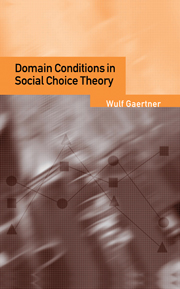Crossref Citations
This Book has been
cited by the following publications. This list is generated based on data provided by Crossref.
Martin, Mathieu
and
Merlin, Vincent
2004.
Les apports de la théorie du choix social pour l'analyse de la démocratie.
Cahiers d'économie Politique,
Vol. n° 47,
Issue. 2,
p.
53.
Perote-Peña, Juan
and
Piggins, Ashley
2005.
Pareto efficiency with spatial rights.
Journal of Mathematical Economics,
Vol. 41,
Issue. 3,
p.
265.
Ozdemir, Ugur
and
Sanver, M. Remzi
2006.
Dictatorial domains in preference aggregation.
Social Choice and Welfare,
Vol. 28,
Issue. 1,
p.
61.
Puppe, Clemens
and
Tasnadi, Attila
2006.
Nash Implementable Domains for the Borda Count.
SSRN Electronic Journal,
Doğan, Emre
and
Sanver, M. Remzi
2008.
Arrovian impossibilities in aggregating preferences over non-resolute outcomes.
Social Choice and Welfare,
Vol. 30,
Issue. 3,
p.
495.
Puppe, Clemens
and
Tasnádi, Attila
2008.
Nash implementable domains for the Borda count.
Social Choice and Welfare,
Vol. 31,
Issue. 3,
p.
367.
Saari, Donald G.
2009.
The Mathematics of Preference, Choice and Order.
p.
161.
Lauwers, Luc
2009.
The topological approach to the aggregation of preferences.
Social Choice and Welfare,
Vol. 33,
Issue. 3,
p.
449.
Hudry, Olivier
2009.
Encyclopedia of Complexity and Systems Science.
p.
9942.
Indo, Kenryo
2009.
Agent-Based Approaches in Economic and Social Complex Systems V.
Vol. 6,
Issue. ,
p.
93.
van Deemen, Adrian
and
Saiz, M. Elena
2010.
Collective Decision Making.
Vol. 43,
Issue. ,
p.
69.
Barberà, Salvador
and
Ehlers, Lars
2011.
Free triples, large indifference classes and the majority rule.
Social Choice and Welfare,
Vol. 37,
Issue. 4,
p.
559.
Hudry, Olivier
2012.
Computational Complexity.
p.
3291.
MARTIN, MATHIEU
and
SALLES, MAURICE
2013.
SOCIAL CHOICE AND COOPERATIVE GAME THEORY: VOTING GAMES AS SOCIAL AGGREGATION FUNCTIONS.
International Game Theory Review,
Vol. 15,
Issue. 03,
p.
1340012.
Grandi, Umberto
and
Endriss, Ulle
2013.
First-Order Logic Formalisation of Impossibility Theorems in Preference Aggregation.
Journal of Philosophical Logic,
Vol. 42,
Issue. 4,
p.
595.
List, Christian
Luskin, Robert C.
Fishkin, James S.
and
McLean, Iain
2013.
Deliberation, Single-Peakedness, and the Possibility of Meaningful Democracy: Evidence from Deliberative Polls.
The Journal of Politics,
Vol. 75,
Issue. 1,
p.
80.
Van Deemen, Adrian
2014.
On the empirical relevance of Condorcet’s paradox.
Public Choice,
Vol. 158,
Issue. 3-4,
p.
311.
Duddy, Conal
2014.
Condorcet’s principle and the strong no-show paradoxes.
Theory and Decision,
Vol. 77,
Issue. 2,
p.
275.
2014.
Judgment Aggregation: A Primer.
Perote-Peña, Juan
and
Piggins, Ashley
2015.
A MODEL OF DELIBERATIVE AND AGGREGATIVE DEMOCRACY.
Economics and Philosophy,
Vol. 31,
Issue. 1,
p.
93.



